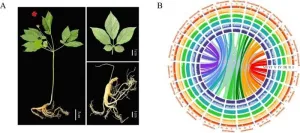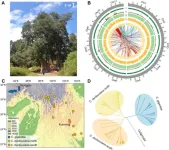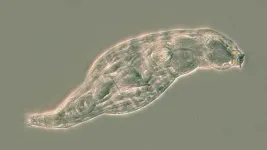(Press-News.org) The recent surge in people seeking mental health care across the country has led to long wait times for first appointments with therapists and psychiatrists.
Now, a new study offers hope that while they wait to get care, patients could still get some relief by using evidence-based smartphone apps and wearable devices to track sleep and activity.
The study shows that depression and anxiety symptoms, and suicidality, all decreased measurably when patients were assigned to mobile applications that incorporated mindfulness practices, cognitive-behavioral therapy skills, or prompts that encouraged mood-enhancing activities.
The study, conducted at Michigan Medicine, the University of Michigan’s academic medical center, is published in JAMA Network Open. It involved just over 2,000 patients scheduled to get care in coming weeks from a mental health provider at outpatient U-M Health or U-M student clinics.
Adam Horwitz, Ph.D., the U-M Medical School psychologist who is the paper’s lead author, called the results encouraging, with implications for individuals and clinics alike.
“Having this type of option, especially for people who are motivated enough to seek an appointment and wait for it, could be very valuable when providers have long wait lists,” said Horwitz, who is an assistant professor in the Department of Psychiatry. “These individuals want to be doing something about their mental health but don’t yet have access, so this suggests that providing them with some sort of digital option when their motivation is already high, and they are ready to do something, could begin to make a difference.”
Combining app prompts and wearable device data
Nearly all the patients completed standardized mental health assessments both at the start of the study and after six weeks of using the app they had been randomly assigned to install on their smartphone. All participants also wore a study-provided Fitbit or their own Fitbit or smartwatch, to track sleep and physical activity.
The study randomly assigned most participants to one of two commercial apps – Silvercloud, which is based on cognitive behavioral therapy principles, and Headspace, which coaches users in mindfulness techniques. Both apps have been shown separately to help alleviate mental health symptoms, but have never been tested against one another.
Some study participants were randomly assigned to receive a customized version of the study app called MyDataHelps, either alone or together with one of the commercial apps. Those randomized to receive this app received positive encouraging prompts twice per day based on their activity tracker data -- for example, applauding them for walking or getting a good amount of sleep, or suggesting a simple act to improve their mood.
Improvement in all groups
Surprisingly, no matter what group they were in, the participants’ scores on standard mental health scales changed for the better by the end of the study period.
At the start of the study, depression scores on average were just under 13 on the 27-point PHQ-9 scale; all groups dropped by two to three points by six weeks. Scores on the 21-point GAD-7 anxiety scale dropped by 1.5 to 2 points across the board.
Meanwhile, scores on measures of protection against suicide risk increased slightly, with the most improvement among participants using Headspace. Scores on the suicide risk measurement dropped slightly across the board, indicating lower risk for suicidal behavior.
Most of the study participants had their initial appointment with a U-M mental health provider before the end of that six-week period, but the drop in mental health scores was similar for those who hadn’t yet started professional treatment.
More research ahead
Horwitz notes that the newly published study, called PROMPT, helped inform the development of a much larger study called COMPASS based at U-M that just got $17.9 million in funding from the National Institute of Mental Health.
The COMPASS study will involve not only smartphone apps, wearable activity trackers and standardized mental health assessments, but also genetic tests and other types of data collection. It will involve thousands of U-M Health and U-M student clinic patients who are waiting for their first mental health-related appointment.
Both PROMPT and COMPASS seek to help researchers develop a more personalized approach to mental health care.
They hope to identify which characteristics make someone more likely to respond positively to different forms of treatment or support, so they can use this knowledge to reduce the time it takes to find the approach that helps each individual.
Future directions
Horwitz notes that people seeking mobile-based mental health support have many apps to choose from – and that most of those apps haven’t gotten scrutiny through objective research. Headspace and Silvercloud have more objective evidence behind them than most of these apps, he notes.
He and his colleagues were surprised but encouraged to see improvement in the group using the customized version of MyDataHelps, too.
Part of the reason may have to do with the study population: people who were motivated to seek help for mental health concerns, had already been on a waiting list to get scheduled, and now had been scheduled and were waiting to be seen.
Because mental health conditions can wax and wane in their symptom severity, apps that support someone during an especially low-mood or high-anxiety time could be important for helping them endure the time until their first appointment.
Horwitz notes that the study participants’ clinical providers didn’t have access to their app data. But, he said, this might be a potential option for clinics moving forward if patients want to grant that access by allowing their app to share a summary with their clinic.
Data from mental health apps could even potentially help providers or systems understand which patients need the most-intensive approaches to psychiatric care, and which might be able to do all right with less-intensive care. That could also improve the waiting list situation for all patients, he notes.
He likens this to a relay race.
“If we can use apps to give the patient a bit of momentum on understanding and managing their symptoms, even before they get to clinic, then perhaps that will help them get more out of therapy once they get to clinic and pass the baton from the app to a professional provider,” he said. “The apps don’t have the same effect as therapy, but doing something while waiting is still important.”
In addition to Horwitz, the study’s authors are Elizabeth D. Mills, Ph.D., of the U-M Department of Anesthesiology, Srijan Sen, M.D., Ph.D., and Amy S.B. Bohnert, Ph.D. Sen, a professor of psychiatry, directs the U-M Eisenberg Family Depression Center and is a member of the Michigan Neuroscience Institute; Bohnert is co-director of the U-M Opioid Research Institute and a professor of anesthesiology. Bohnert and Sen are two of the three leaders of the COMPASS study.
The PROMPT study was funded by Precision Health at U-M and the Eisenberg Family Depression Center as well as the National Institute of Mental Health (MH131761).
Comparative Effectiveness of Three Digital Interventions for Adults Seeking Psychiatric Services, JAMA Network Open, DOI:10.1001/jamanetworkopen.2024.22115
END
Mental health apps may help those waiting for care, study finds
Depression, anxiety and suicide risk dropped when patients awaiting an initial psychiatric appointment used smartphone apps to get CBT, mindfulness or encouragement prompts
2024-07-18
ELSE PRESS RELEASES FROM THIS DATE:
Ginseng's full genome sequenced: unraveling the roots of a medicinal marvel
2024-07-18
A landmark study has successfully decoded the complete ginseng genome, unveiling the genetic mechanisms that govern saponin biosynthesis. This detailed genetic map illuminates the evolutionary and metabolic pathways of Panax ginseng, a staple in traditional medicine. This pivotal discovery promises to drive forward breeding initiatives and augment the plant's medicinal qualities, unlocking new possibilities for therapeutic applications.
Ginseng's role in traditional medicine is underscored by its complex genetic structure due to its allotetraploid nature. The study delves into this complexity, revealing key evolutionary insights into ...
Against the odds: The genetic secrets of a rare conifer's climate change defiance
2024-07-18
In a remarkable twist of evolutionary adaptation, the rare Tibetan cypress, Cupressus gigantea, has shown unexpected genetic resilience. Despite facing the brink of extinction due to climate change and habitat loss, the species has experienced a significant reduction in harmful genetic mutations. This discovery sheds new light on the complex interplay between genetic diversity and population decline, challenging conventional understandings of genetic load in endangered species.
Conifers, including Cupressus species, are ecologically and culturally significant, but many are threatened by climate change and human activities. ...
Hydroxyurea does not reduce ovarian reserve in female patients with SCD
2024-07-18
(WASHINGTON, July 18, 2024) – In female patients living with sickle cell disease (SCD), hydroxyurea had no effect on ovarian reserve, suggesting that fertility preservation measures prior to treatment may be unnecessary, according to a study published in Blood Advances.
SCD is the most common inherited red blood cell disorder in the United States, affecting an estimated 100,000 people. According to the Centers for Disease Control and Prevention (CDC), SCD affects one out of every 365 Black or African American births and one out ...
A “wrenaissance” for House Wrens; species and genus splits for Barn Owls and Plovers; and lumping of Redpolls included in 2024 Check-list changes
2024-07-18
CHICAGO — July 18, 2024 — The 65th Supplement to the American Ornithological Society’s (AOS’s) Check-list of North American Birds, published today in Ornithology, includes several updates to the classifications of bird species found in North America, Central America, and the Caribbean.
A few highlights from this year’s supplement, detailed below, include species splits for Troglodytes aedon (House Wren) and Tyto alba (Barn Owl); a lumping of Acanthis flammea (Common Redpoll), Acanthis ...
NFCR welcomes two new Board of Directors
2024-07-18
Rockville, MD – July 18, 2024
The National Foundation for Cancer Research (NFCR) announced new Board of Directors members today who both have been long-term supporters of the organization: Silas Deane, Vice President, Tyler Technologies, and Dr. Padmakumar Kaimal, previous Vice President of Technology Alliance & Business Development at Suven Life Sciences. The areas of expertise and leadership they bring to NFCR signify a pivotal moment for the organization working to advance the mission of providing new areas of hope and solutions for cancer patients worldwide.
Silas Deane has extended expertise in technology, healthcare, government relations, ...
In decade-first for Japan, Kyushu U Professor is elected as International Fellow of the British Academy
2024-07-18
Fukuoka, Japan — On 17 July 2024, the British Academy held its Annual General Meeting, where Koji Mizoguchi, Professor of Archaeology at Kyushu University's Faculty of Social and Cultural Studies, was elected as an International Fellow. He is the first Japanese archaeologist and the first researcher from Kyushu University to receive this honor.
Founded in 1902, the British Academy aims to deepen and share understanding of people, societies, and cultures across time and place, enabling ...
PEPITEM – a novel protective agent for inflammageing
2024-07-18
A naturally occurring peptide called PEPITEM could potentially rejuvenate the immune response in older individuals and protect against 'inflammageing', which is widely believed to be the root cause of many age-related diseases.
The study, published today in the journal npj Aging, raises the exciting possibility of a protective agent that could dampen age-related inflammation and restore normal immune function in older adults.
PEPITEM (Peptide Inhibitor of Trans-Endothelial Migration) was initially identified at the University ...
Small animals acquire genes from bacteria that can produce antibiotics
2024-07-18
WOODS HOLE, Mass. -- A group of small, freshwater animals protect themselves from infections using antibiotic recipes “stolen” from bacteria, according to new research by a team from the University of Oxford, the University of Stirling and the Marine Biological Laboratory (MBL), Woods Hole.
The tiny creatures are called bdelloid rotifers, which means ‘crawling wheel-animals’. They have a head, mouth, gut, muscles and nerves like other animals, though they are smaller than a hair’s breadth.
When these rotifers are exposed to fungal infection, the study found, ...
Unexpected role of OTX2 drives aggressive medulloblastoma
2024-07-18
In a report published in Nature Cell Biology, researchers at Baylor College of Medicine, Texas Children’s Hospital, the University of Manitoba and collaborating institutions revealed an unexpected way in which the protein OTX2 drives the progression of medulloblastoma – the most common aggressive childhood brain cancer. The findings suggest that targeting OTX2 or its effects can have therapeutic relevance.
“We see medulloblastoma stem cells as the root of the disease. The tumors develop from these cells early during development of the cerebellum, the brain region ...
Study shows new efficiency standards for heavy trucks could boost energy use
2024-07-18
Deliveries are getting faster than ever in the U.S., but the faster movement of goods is undercutting the country’s climate progress.
In a new study published July 18 in the journal Nature Energy, a CU Boulder researcher and his collaborator estimate that federal regulations aimed at enhancing heavy-duty trucks’ energy efficiency could be as much as 20% less effective than policymakers initially anticipated.
That’s because the regulations make trucking cheaper. As a result, more shippers will likely switch from using less energy-intensive rail transportation to using more energy-intensive trucks to ship goods.
“We ...
LAST 30 PRESS RELEASES:
Kidney cancer study finds belzutifan plus pembrolizumab post-surgery helps patients at high risk for relapse stay cancer-free longer
Alkali cation effects in electrochemical carbon dioxide reduction
Test platforms for charging wireless cars now fit on a bench
$3 million NIH grant funds national study of Medicare Advantage’s benefit expansion into social supports
Amplified Sciences achieves CAP accreditation for cutting-edge diagnostic lab
Fred Hutch announces 12 recipients of the annual Harold M. Weintraub Graduate Student Award
Native forest litter helps rebuild soil life in post-mining landscapes
Mountain soils in arid regions may emit more greenhouse gas as climate shifts, new study finds
Pairing biochar with other soil amendments could unlock stronger gains in soil health
Why do we get a skip in our step when we’re happy? Thank dopamine
UC Irvine scientists uncover cellular mechanism behind muscle repair
Platform to map living brain noninvasively takes next big step
Stress-testing the Cascadia Subduction Zone reveals variability that could impact how earthquakes spread
We may be underestimating the true carbon cost of northern wildfires
Blood test predicts which bladder cancer patients may safely skip surgery
Kennesaw State's Vijay Anand honored as National Academy of Inventors Senior Member
Recovery from whaling reveals the role of age in Humpback reproduction
Can the canny tick help prevent disease like MS and cancer?
Newcomer children show lower rates of emergency department use for non‑urgent conditions, study finds
Cognitive and neuropsychiatric function in former American football players
From trash to climate tech: rubber gloves find new life as carbon capturers materials
A step towards needed treatments for hantaviruses in new molecular map
Boys are more motivated, while girls are more compassionate?
Study identifies opposing roles for IL6 and IL6R in long-term mortality
AI accurately spots medical disorder from privacy-conscious hand images
Transient Pauli blocking for broadband ultrafast optical switching
Political polarization can spur CO2 emissions, stymie climate action
Researchers develop new strategy for improving inverted perovskite solar cells
Yes! The role of YAP and CTGF as potential therapeutic targets for preventing severe liver disease
Pancreatic cancer may begin hiding from the immune system earlier than we thought
[Press-News.org] Mental health apps may help those waiting for care, study findsDepression, anxiety and suicide risk dropped when patients awaiting an initial psychiatric appointment used smartphone apps to get CBT, mindfulness or encouragement prompts



